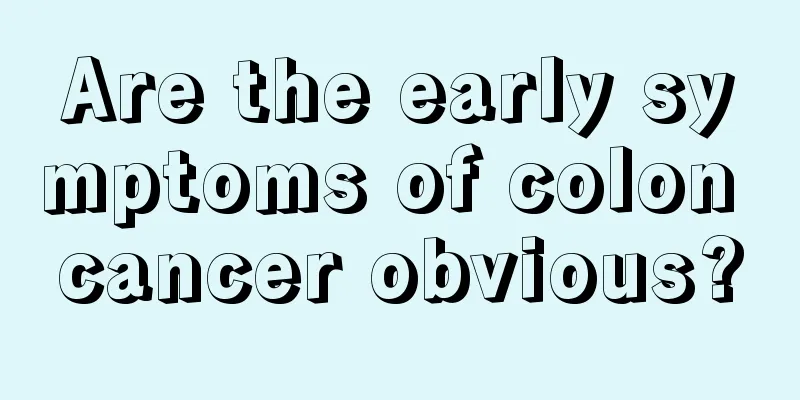Are the early symptoms of colon cancer obvious?

|
The early symptoms of colon cancer are usually not obvious. Most patients may not have obvious discomfort in the early stage, but some people may have mild symptoms such as persistent diarrhea, constipation, blood in the stool or abdominal pain. Since these symptoms are easily confused with common gastrointestinal problems, early detection is more difficult, so regular physical examinations and timely medical treatment are very important. 1) Possible manifestations of symptoms: Patients with early-stage colon cancer may experience mild intestinal dysfunction, including changes in bowel movement frequency (such as alternating diarrhea and constipation), thinner or bloody stools, abdominal pain or discomfort, etc. Some patients may also experience unexplained fatigue, weight loss, or anemia. However, these symptoms are often mild or intermittent and are easily overlooked. 2) How to distinguish early symptoms of colon cancer from common gastrointestinal problems: Ordinary gastrointestinal problems are usually short-term and easily affected by diet, stress or infection. Symptoms may resolve on their own within a few days, while symptoms related to colon cancer usually last longer or gradually worsen. If you find persistent changes in your stool, blood in your stool, gradually increasing abdominal pain, or significant unexplained weight loss, it is recommended to seek medical attention as soon as possible. 3) How to check and prevent: Early diagnosis of colon cancer usually requires the help of medical examinations, such as fecal occult blood test (FOBT), colonoscopy or imaging examinations (such as CT colonography). Colonoscopy can directly observe whether there are lesions inside the colon, which is an important means of diagnosis. For high-risk groups (such as those with a family history of disease or chronic enteritis), it is recommended to start regular screening after the age of 45. 4) Daily prevention and suggestions: (1) Maintain good eating habits, eat more fiber-rich foods (such as vegetables, fruits, and whole grains), and reduce high-fat and high-red meat foods. (2) Actively exercise, with at least 150 minutes of low-intensity aerobic exercise per week to help maintain intestinal health. (3) Quit smoking and limit alcohol consumption to avoid increasing the risk of cancer due to these bad lifestyle habits. Since the early symptoms of colon cancer are usually hidden and not obvious, they are easily ignored by patients. It is recommended that everyone undergo regular physical examinations, especially those in high-risk groups, who should remain vigilant and pay attention to subtle changes in their bodies. If suspicious symptoms occur, seek examination and guidance from a professional doctor as soon as possible. Prevention is better than cure, and a healthy lifestyle and early screening are important means to reduce the incidence of colon cancer. |
<<: The cure rate of lymphoma at the age of 69
Recommend
What are the hazards of smokeless mosquito coils
Because mosquito coils have entered thousands of ...
Is milk an acidic food or an alkaline food?
Milk can be said to be a food that is recognized ...
How can renal hamartoma be diagnosed?
The diagnosis of renal hamartoma requires imaging...
Gather together, the class on tips for removing frostbite scars is about to begin!
Due to the cold weather in winter, the face and h...
Chinese medicine formula for lung cancer metastasis to bone cancer
If a cancer patient has been diagnosed with metas...
Feeling of heaviness in the abdomen
Pregnant women always experience various discomfo...
Experts suggest: Prevention of colorectal cancer should start with eating habits
The incidence of colorectal cancer is often relat...
Should I tear off the plastic film on the mattress?
When you buy a new mattress from outside, you wil...
The effect of climbing fork
Cicada pupae are a common food in summer. In the ...
What is the cure rate of childhood skin cancer?
What is the cure rate of childhood skin cancer? T...
Can waist CT detect bone cancer?
Lumbar CT can assist in the diagnosis of bone can...
Why can't anal fissure heal?
If you find that you have anal fissure, it is bes...
Why does water come out of the buttocks after moxibustion?
I believe that everyone pays great attention to t...
Are there male and female crucian carps?
Crucian carp is a very common edible fish in my c...
Konjac shreds calories
Konjac is a very common food ingredient in our da...









